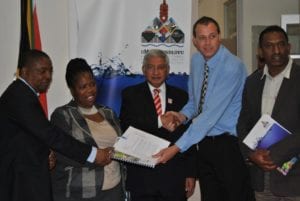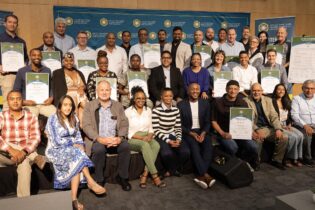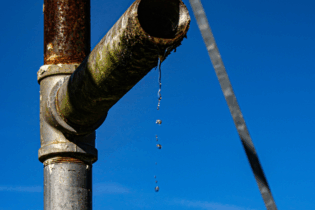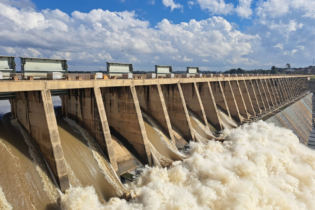The uMgungundlovu District Municipality (uMDM) has secured a multimillion-rand funding package for its Water Lifeline Project from the Netherlands-based Facility for Infrastructure Development ORIO. Jeffares & Green, technical director: Neal Bromley speaks to Debbie Besseling about the project.
Jeffares & Green’s water sector institutional support team assisted the uMgungundlovu District Municipality (UMDM) in Pietermaritzburg secure a €14 million grant to augment their own funding of R240 million to help provide better water services in its six local municipalities, namely Mkhambathini, Richmond, uMngeni, Mpofana, uMshwathi and Impendle. The funding comprises a grant from the Netherlands-based Facility for Infrastructure Development (ORIO). ORIO is funded by the Dutch Ministry of Foreign Affairs, and finances the development, implementation, construction, expansion, operation and maintenance of public infrastructure in developing countries.Project background
The uMDM has recently taken over the responsibility of the provision of water and sanitation services as one of its core functions, in line with its mission to be a “water-centric, performance-oriented, results-driven municipality”. This added responsibility has resulted in a number of challenges that the uMDM is prepared to meet head on, namely:
• A large proportion of the district, which excludes Msunduzi, is rural and poverty-stricken with little social and physical infrastructure and very little economic opportunity.
• The district has inherited an ageing, and in many cases, failing, water infrastructure system from previous water services authorities.
• Due to the enormity of the water and sanitation backlog, and available grant funding (MIG), it is only able to address backlog eradication as part of its next five- to ten-year programme.
• The utilisation of the system is already at 100%, and with huge non-revenue water at an estimated 66%, the existing demand for water cannot be sustained any longer and neither can supply be extended to growing communities that have no water.
• Water-related health issues are on the increase.
• New development prospects, such as housing schemes for the poor and industrial development, have been halted. According to Bromley: “The uMgungundlovu District Municipality applied for the funds in order to address the issue of the limited water supply being experienced in the uMngeni River supply system and its limiting effect on Local Economic Development (LED).
“For some time there has also been an urgent need to address serious water losses caused by the ageing water infrastructure, further aggravated by overloading the system, which can no longer cope with the ever-growing demand. Water currently being lost through leaks and bursts can be utilised by the district municipality to provide basic services and unlock LED across the district.” The Water Lifeline Project will provide the much needed structural and technical support to move the uMDM from a place of crisis management to a position of proactive and preventative planning and operations.
Project objectives
• Reduce water losses within the system to enable development within the current estimated yield of the uMgeni River system.
• Replace bulk infrastructure to ensure it can cope with current demands, projected future demands, as well as upcoming backlog eradication projects.
• Supply areas where limited or no potable water is being delivered.
• Replace and upgrade infrastructure along the N3 corridor to increase services, thereby enabling potential housing and industrial developments that will, in turn, uplift communities and create short-term and long-term employment opportunities.
• Implement sustainable training and artisan development programme to ensure effective implementation and operation and maintenance (O&M) for the project and capacitate the municipality adequately.
• Develop small emerging enterprises.
Project phases
The first funding tranche of R15 million is for the development phase, during which development, planning, preliminary design and scoping of training needs will be carried out for the period of one year – expected to start on 1 March 2012.
The project scope is to upgrade and extend the existing secondary bulk water supply pipelines and reticulation networks with an estimated 95% of the reticulation network being improved by this project. The project is based on the need to reduce or manage the water demand within this system which is currently limited to the available yield. The resultant water savings will enable the district to supply new areas with water and thereby promote vital LED.
Anticipated project results Water supply
• Improve water services to approximately 450 000 people.
• Reduce water losses.
• Reduce interrupted services to consumers by reducing the total number of significant pipe failures.
• Replace approximately 168 km AC pipes.
• Improve the financial performance of the municipality by increasing the billed customers.
• Supply water to approximately 20 000 people who currently have either no service or an interrupted service.
• Reduce the incidences of water-borne diseases (health and hygiene programme) through the supply of potable water.
• Potentially create 80 000 new jobs, thereby bringing about economic development and upliftment in the District.
• Enable new development investments in the region, currently stalled due to inadequate services provision. Training and education
• Technical training and skills development programmes to community members.
• Apprenticeships and artisan training in plumbing and building.
• Various internship programmes.
• Contractor and business development mentorship and training to community and project beneficiaries.
• Employment and up-skilling for approximately 15 500 temporary workers and further construction training for an estimated 2 300 of these people. Bromley says, “Although almost the entire district will be positively affected, the biggest impact will be on the poor communities who will benefit enormously from the upliftment programme via the new and improved services, employment opportunities and various technical training programmes.”







